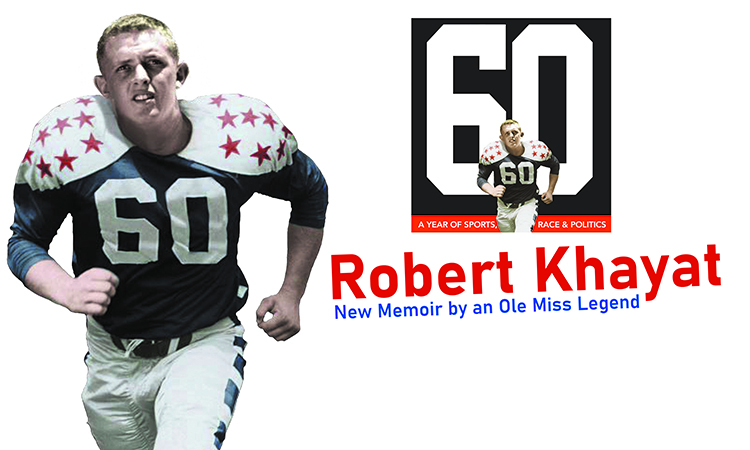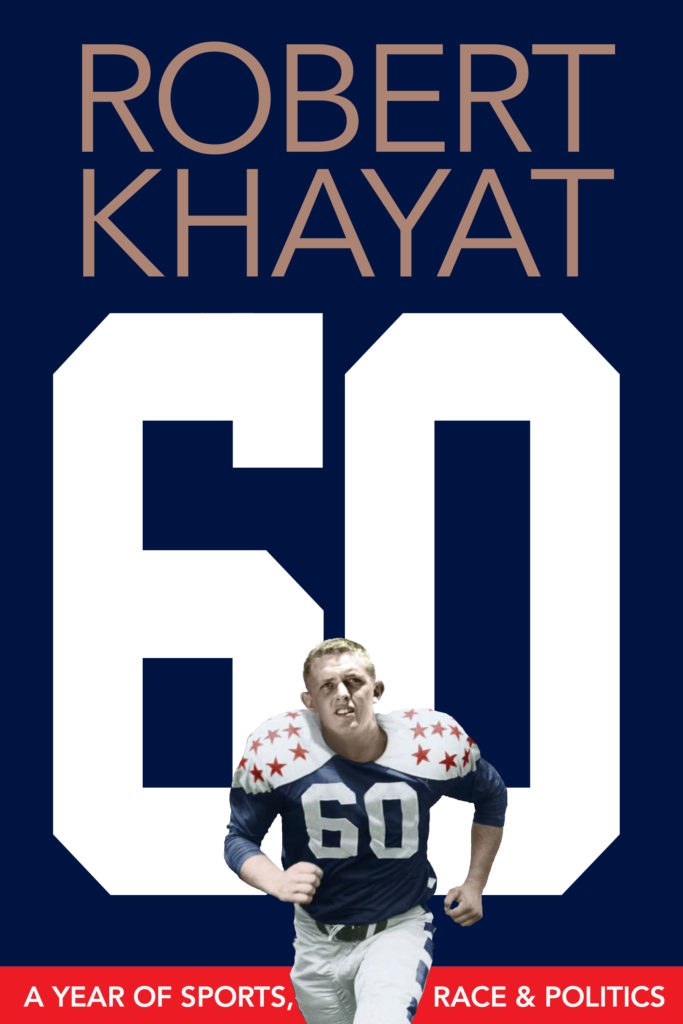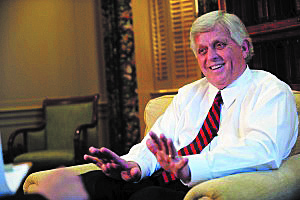
The new memoir by Chancellor Emeritus Robert Khayat, 60: A Year of Sports, Race & Politics (Nautilus, 2021), is now on sale at bookstores everywhere, including Square Books in Oxford, where you can also purchase a signed bookplate edition. You can shop Square Books online, by phone, or in person. You may also order online, or for more information, by visiting RobertKhayat.com.
Local Voice editor Nature Humphries recently spoke with Dr. Khayat about writing, values, and mentorship.
Your second memoir, 60: A Year of Sports, Race & Politics, has just been released. How did the writing process differ from The Education of a Lifetime?
I would say it was about the same. Everything I say I wanted to be the truth, and I’m careful about that. Neil [White] did such a good job of organizing what I wrote. When I got started three years ago on this book, he said “You just write; when it comes to you, sit down and write it.” So I did. I wrote about football, I wrote about teaching, I wrote about childhood, I wrote about people—things like that. I wrote about a potpourri of subjects. I didn’t just write about one thing. That was his suggestion. Then he took what I wrote—and I wrote about 300,000 words, which was a lot—and there were about 280,000 more that I needed to write. Apparently, I needed to write all that for him to pull out of it what’s in the book. We then decided together [to try to] to present it in a way that is interesting to read and accurate, of course, and also that it would address issues in our society that we faced as a group of people as well as individually.
There’s a big story to this about race, and in that discussion you have to be careful … I recounted some of the things that happened during the pinnacle of my football career in 1960. There’s a big section on race, and it contrasts the segregationist group, Governor Barnett, with the Kennedy family and the national movement towards a kinder, gentler nation. Respect for individuals, that’s really my core message about how you treat people—you just treat them with respect. It doesn’t matter if they’re male or female, or White or Black, or Native American, or Asian, that doesn’t make any difference. A person is a person. Unless they give you a reason to not respect them.
Some of the language in this book relates to people who were claiming we should stay segregated, and then some of the language [represents] the people [who believed] that’s not right, that we need to move toward a fully integrated society. I think we did a decent job of putting that out there without—we may have offended some people. I hope not. But we didn’t put any milquetoast in there, we cited real-life examples of the stress and the conflicts and the disagreements.
That’s a long answer to your question. I wrote the material, he organized it and edited it, rearranged it, and then rewrote it again. That’s the result. I hope it’ll be something that people enjoy reading, and maybe learn something from.
I read in an article online that John Grisham considers you a mentor. I think many people do. What values do you hope to pass along to those who look up to you?
You’re really blessed—fortunate, lucky, whatever you want to call it—if you’re in a family that has a strong value system. I was in a family of six—four children and my mother and dad. We were poor. My dad was a schoolteacher for a third of his life and a politician for the other two thirds. We we lived by the values we were taught, and we believed in them, my two sisters and my brother and me. At the center of our family was love. We genuinely had an abiding love for each other. We fussed and fought, of course, as children—people do that. But we loved each other. That’s one.
Two, is the value of respect. We learned early on to treat everybody with respect. If you couldn’t do that, then just stay out of the conversation.
The third one was to have successful relationships with your colleagues, with your kids, but also with your teachers, and with your employers, and with your competitors. If you treat people with respect, you can be successful in your relationships.
Another value that I would say was important in my family was our spiritual life. We always had blessings and prayers. Another one would be physical fitness by taking care of your body and your mind, and being engaged with an active, physical life.
Who are some of your own mentors?
First of all my mother and father. My high school football coach, Earl Howell, whose nickname was Dixie—Earl “Dixie” Howell. Many faculty members along the way who were challenging and inspirational. One would be a man named John Moore who taught History, and his wife, Margaret Moore, who taught European History. They were great teachers and they had a lot to do with how I learned to read and write and think. I would say Coach Vaught was a mentor. Friends along the way. John [Grisham] says I’m one of his, but he’s one of mine. He’s maintained a remarkable balance and a steady value system in spite of his astronomical success. He’s still the same person he was before. He just is mature and very successful, but he hasn’t changed his value system. There are others, of course, but those people were critical.
Who is your all-time favorite Rebel?
My high school coach, Dixie Howell. Number 31 on the 1947 SEC Championship team. I loved him deeply. He coached my team two years, and he transformed our whole High School with his leadership and he was a good friend to me his whole life.





